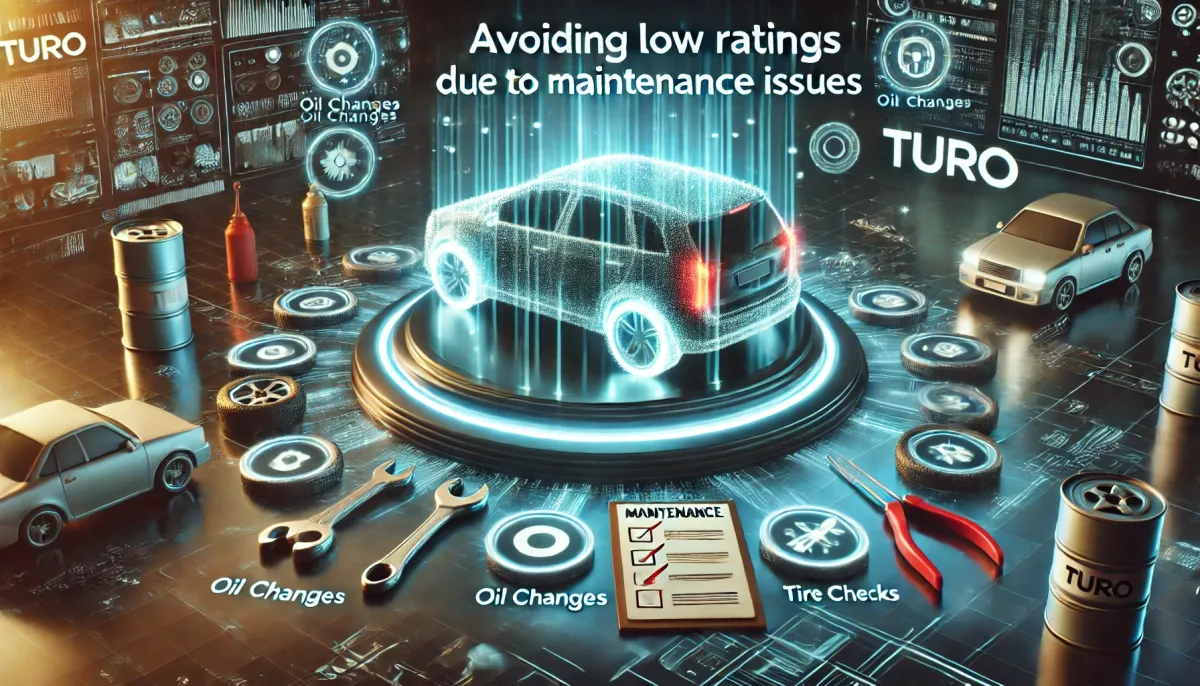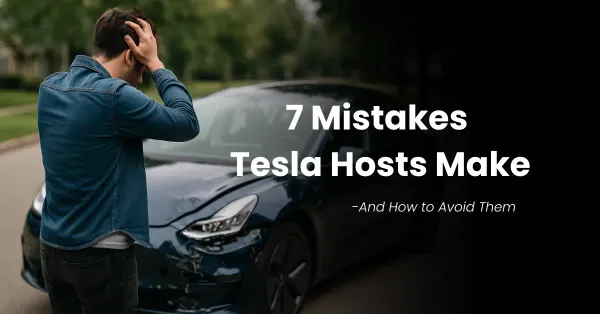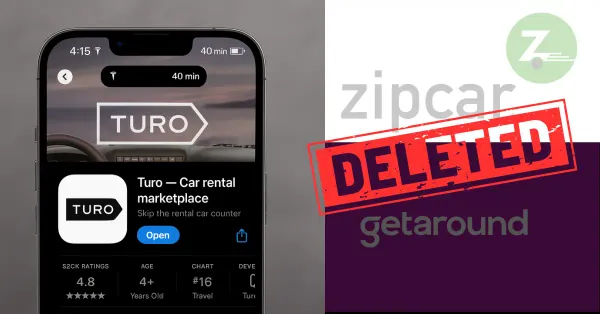Can Turo Hosts Avoid Low Ratings Due to Maintenance Issues? What You Need to Know
In this detailed guide, we will break down how Turo hosts can avoid receiving low ratings due to maintenance issues, with a deep dive into the importance of regular vehicle upkeep, how to manage guest expectations, and strategies for addressing potential issues before they affect your ratings.

Introduction: Can Turo Hosts Avoid Low Ratings Due to Maintenance Issues?
As a Turo host, ensuring your car is well maintained is essential to providing a safe, reliable, and pleasant experience for your guests. Maintenance problems, whether mechanical or cleanliness related, are often the source of low ratings and negative reviews. This can severely impact your ability to attract future customers and, in turn, affect your income.
Most Turo guests expect a reliable, well kept vehicle when they rent from you. A failure to meet these expectations can lead to negative feedback, which is a risk that any rental business owner should work hard to avoid. But how can you ensure that maintenance issues don’t drag down your ratings?
In this comprehensive guide, we will cover:
- Why regular maintenance matters for hosts.
- The impact of maintenance issues on your ratings.
- Practical strategies to prevent maintenance related complaints.
- How to handle low ratings and turn negative experiences into positive ones.
By implementing proactive maintenance strategies, Turo hosts can greatly reduce the risk of receiving negative feedback due to mechanical issues or other preventable problems.
Why Maintenance Matters for Turo Hosts
Regular maintenance is key to keeping your car in top condition and preventing breakdowns or inconveniences during a guest’s rental period. The following are the core reasons why maintenance should be a priority for any Turo host:
Preserves Vehicle Value
Regular service helps maintain the car’s resale value and ensures it runs efficiently for years. Ignoring minor issues can lead to major breakdowns, which can become much costlier to fix in the long run. By staying on top of maintenance, such as oil changes and tire rotations, you can avoid these bigger issues and preserve the vehicle's value, which is especially important for high end or luxury cars.
Protects Your Reputation
A well maintained vehicle is essential to keeping your reputation intact as a reliable Turo host. Turo guests expect a clean, comfortable, and dependable car. When maintenance issues are overlooked, it can create negative experiences for renters, which usually translates into low ratings and bad reviews. This, in turn, damages your reputation, making it harder to secure future bookings. Regular maintenance helps ensure that your guests don’t run into issues, thereby protecting your image.
Builds Guest Trust
Having a well maintained vehicle builds trust between you and your guests. A history of trouble free rentals, where guests have a smooth experience with no unexpected breakdowns, boosts their confidence in renting from you again. Providing a consistently high level of service encourages guests to leave positive feedback, fostering long term relationships and repeat bookings.
How Maintenance Issues Lead to Low Ratings
Even minor maintenance issues can have a significant impact on your ratings. Here are some of the most common maintenance related problems that lead to low ratings:
Visible Warning Lights
- What Happens: Dashboard warning lights such as check engine lights or low tire pressure warnings are a clear indication that something is wrong with the car. If these lights are visible during a rental, guests may feel that the car is unsafe or poorly maintained, which can result in a low rating.
- Why It Matters: A guest might feel uncomfortable or even unsafe renting a car that has unresolved warning lights. If this issue isn’t addressed beforehand, they are likely to leave negative feedback, regardless of whether the vehicle was in perfect condition or not.
Poor Cleanliness or Upkeep
- What Happens: If a guest notices that the interior or exterior of the car is dirty, it can significantly impact their experience. Cars that appear neglected or poorly maintained, even if the mechanical components are working fine, often receive low ratings.
- Why It Matters: Cleanliness is a basic expectation for any rental. Guests expect a vehicle to be in good condition both mechanically and cosmetically. A lack of attention to cleanliness can create the impression that the host doesn't care about the quality of service, leading to poor reviews.
Unexpected Breakdowns
- What Happens: Nothing frustrates a renter more than an unexpected breakdown, whether it’s an engine stall or a dead battery. These inconveniences are typically preventable with proper maintenance.
- Why It Matters: Breakdowns disrupt the guest's travel plans and often leave a bad impression. When these incidents happen during a rental, it's almost guaranteed that the guest will leave a low rating, which may be difficult to recover from.
Key Strategies to Prevent Maintenance Related Complaints
Preventing low ratings due to maintenance issues requires a proactive approach. Below are several strategies that Turo hosts can implement to keep their cars in top condition and reduce the likelihood of receiving negative feedback.
Follow a Strict Service Schedule
- Why It Works: Maintaining a strict service schedule is essential to ensure that your car stays in peak operating condition. Regular oil changes, tire rotations, and brake checks should be part of a routine maintenance schedule.
- How to Implement:
- Adhere to manufacturer recommended service intervals and ensure all critical systems are regularly checked.
- Keep detailed records of all services and repairs, which will not only help with vehicle longevity but also provide proof of maintenance if guests raise concerns.
Conduct Pre Trip Inspections
- Why It Works: Conducting a thorough pre trip inspection ensures that any potential issues are identified before the guest drives off.
- How to Implement:
- Check fluid levels, tire pressure, lights, and brakes before every rental.
- Use a checklist and take photos of the car’s condition before handing it over to the guest.
- Share any known issues or quirks with the renter to set clear expectations.
Address Known Issues Immediately
- Why It Works: If you know about an issue, no matter how small, addressing it immediately prevents it from escalating into a major problem during the rental.
- How to Implement:
- Fix minor problems like unusual noises, faulty lights, or warning lights as soon as they appear.
- Communicate openly with guests about the issue and assure them that it has been resolved.
Educate Guests on Basic Operations
- Why It Works: Many misunderstandings with guests arise because they’re unfamiliar with the vehicle. Educating them on how to use certain features can prevent complaints about things they don’t fully understand.
- How to Implement:
- Provide a brief tutorial on the car’s features, especially for vehicles with complex systems.
- Address questions about the car’s operation to prevent confusion and frustration.
What to Do If You Receive a Low Rating
Despite your best efforts, a low rating may still occur. If you find yourself in this situation, here are some steps to help mitigate the damage:
Review Trip Photos and Notes
- Why It Works: Comparing your pre trip inspection records with the guest’s comments helps you understand what went wrong and whether the issue was genuinely related to maintenance.
Communicate with the Guest
- Why It Works: Politely ask for feedback to get a clearer understanding of the guest’s concerns. This can lead to a productive discussion and, in some cases, prompt them to revise their rating.
Contact Turo Support
- Why It Works: While Turo doesn’t usually remove ratings over maintenance issues, they may provide assistance in resolving disputes, especially if you can prove that your vehicle was well maintained.
Implement Changes
- Why It Works: If the rating is a result of valid concerns, take that feedback to improve your maintenance processes. Implementing stricter checklists, scheduling repairs earlier, or improving the hand off process can prevent future complaints.
Conclusion: Can Turo Hosts Avoid Low Ratings Due to Maintenance Issues?
Preventing low ratings due to maintenance issues is entirely within your control. By adhering to a strict maintenance schedule, performing regular pre trip inspections, and addressing minor problems promptly, Turo hosts can avoid common issues that lead to negative reviews. Proactive communication and proper documentation can also go a long way in resolving any issues that arise and maintaining a positive relationship with guests.
Frequently Asked Questions (FAQ)
1. How often should I perform maintenance on my Turo vehicle?
It’s recommended to follow the manufacturer’s guidelines, typically every 5,000 to 7,500 miles, depending on the vehicle type and its usage. Ensure you also perform regular safety checks.
2. What are some common maintenance issues that can affect my Turo ratings?
Unresolved warning lights, poor cleanliness, and mechanical issues like dead batteries or engine stalls are common causes of low ratings. Make sure all systems are regularly checked.
3. Can I charge guests for any maintenance related fees?
Yes, you can charge guests for maintenance related issues if they arise during the rental period, especially if they were caused by misuse or negligence.
4. How can I improve my chances of getting positive ratings despite maintenance challenges?
Regular maintenance, clear communication, and a smooth hand off process will help you minimize complaints and increase the likelihood of receiving positive feedback. Always address minor issues before they escalate.
5. What should I do if a guest leaves a negative review about a maintenance issue?
Review the situation, communicate with the guest, and consider offering a solution or compensation. Maintaining





